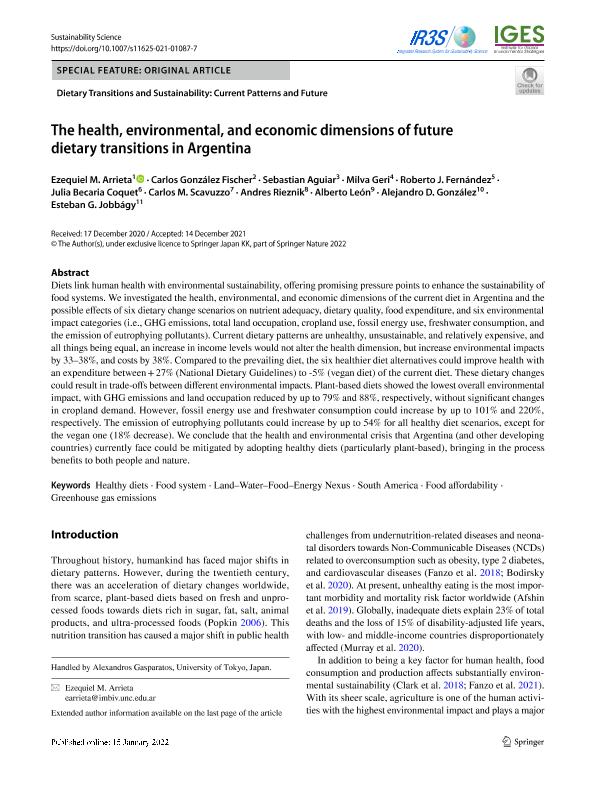Artículo
The health, environmental, and economic dimensions of future dietary transitions in Argentina
Arrieta, Ezequiel Martín ; González Fischer, Carlos; Aguiar, Sebastián
; González Fischer, Carlos; Aguiar, Sebastián ; Geri, Milva
; Geri, Milva ; Fernandez, Roberto J.; Becaria Coquet, Julia
; Fernandez, Roberto J.; Becaria Coquet, Julia ; Scavuzzo, Carlos Marcelo; Rieznik, Andrés Anibal
; Scavuzzo, Carlos Marcelo; Rieznik, Andrés Anibal ; León, Carlos Alberto; Gonzalez, Alejandro Daniel
; León, Carlos Alberto; Gonzalez, Alejandro Daniel ; Jobbagy Gampel, Esteban Gabriel
; Jobbagy Gampel, Esteban Gabriel
 ; González Fischer, Carlos; Aguiar, Sebastián
; González Fischer, Carlos; Aguiar, Sebastián ; Geri, Milva
; Geri, Milva ; Fernandez, Roberto J.; Becaria Coquet, Julia
; Fernandez, Roberto J.; Becaria Coquet, Julia ; Scavuzzo, Carlos Marcelo; Rieznik, Andrés Anibal
; Scavuzzo, Carlos Marcelo; Rieznik, Andrés Anibal ; León, Carlos Alberto; Gonzalez, Alejandro Daniel
; León, Carlos Alberto; Gonzalez, Alejandro Daniel ; Jobbagy Gampel, Esteban Gabriel
; Jobbagy Gampel, Esteban Gabriel
Fecha de publicación:
15/01/2022
Editorial:
Springer Tokyo
Revista:
Sustainability Science
ISSN:
1862-4065
e-ISSN:
1862-4057
Idioma:
Inglés
Tipo de recurso:
Artículo publicado
Clasificación temática:
Resumen
Diets link human health with environmental sustainability, offering promising pressure points to enhance the sustainability of food systems. We investigated the health, environmental, and economic dimensions of the current diet in Argentina and the possible effects of six dietary change scenarios on nutrient adequacy, dietary quality, food expenditure, and six environmental impact categories (i.e., GHG emissions, total land occupation, cropland use, fossil energy use, freshwater consumption, and the emission of eutrophying pollutants). Current dietary patterns are unhealthy, unsustainable, and relatively expensive, and all things being equal, an increase in income levels would not alter the health dimension, but increase environmental impacts by 33–38%, and costs by 38%. Compared to the prevailing diet, the six healthier diet alternatives could improve health with an expenditure between + 27% (National Dietary Guidelines) to -5% (vegan diet) of the current diet. These dietary changes could result in trade-offs between different environmental impacts. Plant-based diets showed the lowest overall environmental impact, with GHG emissions and land occupation reduced by up to 79% and 88%, respectively, without significant changes in cropland demand. However, fossil energy use and freshwater consumption could increase by up to 101% and 220%, respectively. The emission of eutrophying pollutants could increase by up to 54% for all healthy diet scenarios, except for the vegan one (18% decrease). We conclude that the health and environmental crisis that Argentina (and other developing countries) currently face could be mitigated by adopting healthy diets (particularly plant-based), bringing in the process benefits to both people and nature.
Archivos asociados
Licencia
Identificadores
Colecciones
Articulos(IIESS)
Articulos de INST. DE INVESTIGACIONES ECONOMICAS Y SOCIALES DEL SUR
Articulos de INST. DE INVESTIGACIONES ECONOMICAS Y SOCIALES DEL SUR
Citación
Arrieta, Ezequiel Martín; González Fischer, Carlos; Aguiar, Sebastián; Geri, Milva; Fernandez, Roberto J.; et al.; The health, environmental, and economic dimensions of future dietary transitions in Argentina; Springer Tokyo; Sustainability Science; 11; 3; 15-1-2022; 1-17
Compartir
Altmétricas



